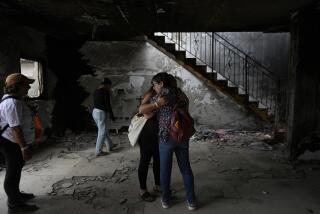Anxiety, Anger Surround Return of Young Survivors
BEIT SHEMESH, Israel — It was long after nightfall when the last bus pulled into this anxious town carrying the young survivors home to their tearful parents.
One by one, the weeping and exhausted schoolgirls struggled down the steps of the bus and into their parents’ arms. They were witnesses to a bloody attack that left seven of their classmates dead, six others injured and turned an annual school outing into a nightmare.
The scene outside the Amit Fierst School on Thursday evening was one of chaos and emotion.
Frantic parents screamed for their daughters from the back of the crowd, unable at first to find them amid the confusion. One young boy sobbed as he grabbed and held his teenage sister, then buried his face in his father’s shirt.
Inside the building, a public junior and senior high school in this working-class town about 10 miles west of Jerusalem, someone had set up a makeshift shrine. There were seven flickering candles and a hand-lettered sign: “May their memory be blessed.”
Nearby, in the crowded, smoke-filled teachers’ lounge, members of Amit Fierst’s eighth-grade class told their stories. They talked about the uniformed Jordanian soldier who chased them, firing wildly with an automatic weapon; about how they jumped into nearby bushes, trying to escape. And about how no one, it seemed, could stop the gunfire.
“All of a sudden, I heard shooting and then we saw everyone running down the hill,” said Natalie Boliti, 13, as another survivor wept quietly beside her.
“One friend was shot from here to here,” she said, indicating her throat and waist. “Another was shot in the neck and another in the stomach.”
Two of her friends had died in the attack, Natalie said. Zion Boliti, standing nearby as his daughter spoke, turned away to hide his brimming eyes.
When the firing finally stopped, another student said, she ran toward her teacher, discovering en route that one of her friends was wounded. She ran to several others, who were lying motionless on the ground.
“We tried to get the other girls lying down to get up,” Yudit Tuito said, her face a mask of shock and grief. “But they couldn’t get up.”
Another student, Ashrat Abudbul, said the gunman had managed to load a second clip into the gun but that it jammed, allowing other soldiers to subdue him. The Jordanian soldiers then “came to us and told us everything was over,” she said.
In the immediate, emotional aftermath, the recriminations flew.
A few parents said they had no idea their children were traveling anywhere near the Jordanian border on the three-day visit to northern Israel. One even said her daughter told her that the trip was to the Negev Desert in southern Israel.
And some blamed the severity of the attack on the Israeli security guards who accompanied the school group, but reportedly complied with Jordanian requests to leave their weapons behind when they entered the border enclave. Otherwise, they might have been able to stop the shooting, several parents said.
“Are the teachers completely crazy, that they took them there?” one mother yelled as she hurried into the building. “It’s a scandal.”
Odelia Peretz, 18, said the group included several friends of her younger sister. Other friends, boys in the school’s eighth-grade class, had made the same trip the week before with no difficulty. But still, she said, the school’s teachers and administrators should have known better than to send any students near the border, no matter how peaceful it seemed to have become.
“It’s a very dangerous trip,” she said flatly. “How could they take them there?”
But Motti Cohen, the father of an uninjured 13-year-old, said he and many other Israelis had become somewhat inured to violence and, even to some extent, terrorism over the years. The country has been through so much, he said, from its many wars to far too numerous shootings, that Israelis could not help but adapt.
Cohen, 47, said he doubted that Thursday’s attack will harm the peace process or relations between Israel and Jordan.
“What can we do?” he asked. “Everything that happens in this country affects all of us, but we can’t take an eye for an eye, a foot for a foot.”
Still, everything was different when his daughter was involved, he acknowledged.
“I’m worried about her,” he said, his face showing fatigue. “I’ve been through wars, but right now, I’m just worried about my daughter and how this will affect her future.”
More to Read
Sign up for Essential California
The most important California stories and recommendations in your inbox every morning.
You may occasionally receive promotional content from the Los Angeles Times.










